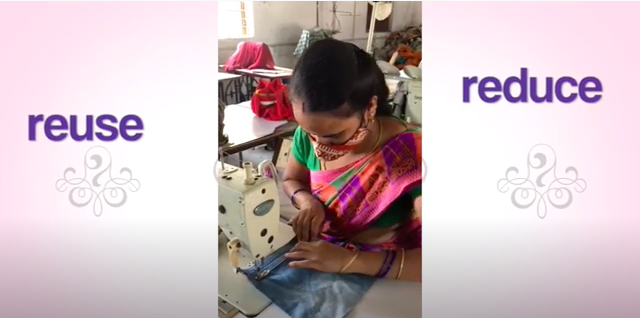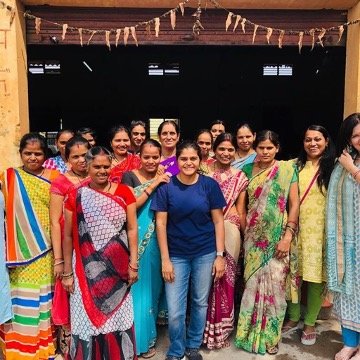Ladies at the MSK center headed by Pooja Iyengar
My name is Pooja Iyengar and I was born in Bhopal, an Indian city infamous for the Bhopal Gas Tragedy in 1984, one of the worst chemical disasters of our times.
I run a nonprofit organization in Bhopal, called Mahashakti Seva Kendra (MSK), established in 1992, with a strong strength of 2000 community members, mostly women.
The organization decided on the slogan “No more Chemicals” leding us to the path of eco-friendliness. We started natural dyes, using handloomed fabric, and started to create the “best out of waste”.
Why was the organization started?
MSK was founded by Ms Indira Iyengar who worked with the Missionaries of Charity to respond to the needs of victims during the Bhopal gas tragedy.
She brought together the voice of the women of the affected communities to express their demand for a vocational training center to be set up for those who had survived the gas tragedy. The founding aim was to help build leadership and train women, in various trades, to help them access their rights, gain agency, and become independent by establishing sustained livelihoods.
Indira Iyengar, along with 500 women, persevered in a long struggle to claim space and were finally allotted 3 work sheds near the Union Carbide factory.
What does MSK do?
Before the Covid-19 pandemic, we were around 50 ladies working at the Center innovating and learning how to curb plastic waste and create upcycled product, but when the lockdown happened, many more ladies from the community turned towards us for help. Most of the men folk in the community were daily wagers and out of work, so suddenly there was a huge number of women looking at us for jobs.
Since MSK was the only nonprofit making cotton masks, cotton gloves, cotton caps, reusable cotton sanitary napkins in Bhopal, orders kept flowing and the ladies became the prime bread earners of their families during that time.

Ms Amuda, a member at MSK, making cotton reusable masks

Ms Sarita, a member at MSK, making reusable cotton sanitary napkins
Which other projects do you do?
At MSK we don’t just teach tailoring, we hold regular workshops on gender equality to reflect on women’ rights and how to deal with gender issues. Through a vocational training program, the ladies learn to read and write as many have not been to elementary/primary school at all or have dropped out. In addition, we add other layers of literacy which is the Social and Emotional Wellbeing which include self-confidence. For this reason, we continuously conduct workshops with researchers at the Center for Sustainable Development, Earth Institute, Columbia University.
In addition, from just a stitching unit, we now have a full fledged computer center also where young girls (dropouts) learn computer skills and spoken English, free of cost, so that they can go out, earn a living and become independent.
Do you have other projects in mind?
I see my NGO growing as a social green enterprise and making more and more women confident and financially independent.
From working in the urban slum, now we are working in Jobat, which is among the 10 most marginalized districts in India. Here will be training 300 tribal ladies in Block printing on fabric with natural dyes, its an ancient tradition of dyeing fabric which is slowly perishing.
In addition, we will soon be starting a program, Green Hub (Central) for the youth of rural and tribal communities in collaboration with Dustyfoot Foundation to engage and empower tribal youth in conservation of biodiversity and sustainable practices in four states of central India (Madhya Pradesh, Chhattisgarh, Jharkhand and Rajasthan) through an innovative model of using the digital platform and open avenues for wider exposure and integration with livelihood options – triggering ideas and action for a more socially equitable and ecologically sustainable future in the region.
How has MSK impacted your personal and others’ people life?
On a macro level, Bhopal has aimed to be cleanest city in the country, under the Swachch (clean) Bharat (India) campaign, so we collaborated with the Bhopal Municipal Corporation, collected old clothes from all the resident Welfare Associations (RWA) and stitched nearly 20,000 cotton bags from those discarded clothes and distributed to all the vegetable markets and shops discouraging people from using plastic bags. Seeing our efforts, we were made the “SWACHCH (clean) BRAND AMBASSADORS” by the Bhopal Municipal Corporation.
We have continued to innovate and experiment with old fabric and have come out with our own product line: reusable sanitary napkins, cotton bags and dog beds with discarded fabric. MSK has become a household name in the city and people look forward to our various products. We have been able to change the mindset of the people and encourage them to move towards a plastic free, eco-friendly lifestyle and encourage them to adopt slow fashion and appreciate products made from old fabric.
On a micro level, our strength has increased from 15 to 50 ladies now working full time at MSK, though our indirect contact touches 2000 women. At the beginning, the ladies involved were extremely shy and would never voice their opinion due to the community where they come from. Men of the house dominate all decisions and women just follow orders and do the household chores, but slowly once they mastered the skill and started getting orders and salaries, I saw a real transformation.
They became more confident, they were voicing their thoughts and discussing their problems with each other and having fun, which was unheard of earlier.

Ladies at MSK making products out of fabric scrap
What are your tips for who would like to follow you example?
If you have a desire to do community service, you should identify your passion first. For example if you wish to work for the elderly, livelihood generation, animal welfare, environment… it could be anything. Start small, time management is a key factor so dedicate one or two hours in a day to your social cause is also enough. Slowly with consistent passion and dedication your work will start yielding results and will benefit more and more people and seeing your passion others will join your cause as well. But you need to be brave and take that first step and then you will lead the way for so many others! One should never give up, keep the fire burning and you will meet like minded people who will join your cause and take it forward with you.
I would like to end with a Hindi quote by very famous poet Majrooh Sultanpuri:

The meaning of this quote is here “I set off alone towards my goal, but, people came along and it began to turn into a caravan!”

Article by poojaiyengar1906@gmail.com; @mahashakti92; @mahashaktiseva1992; www.mskonline.org

